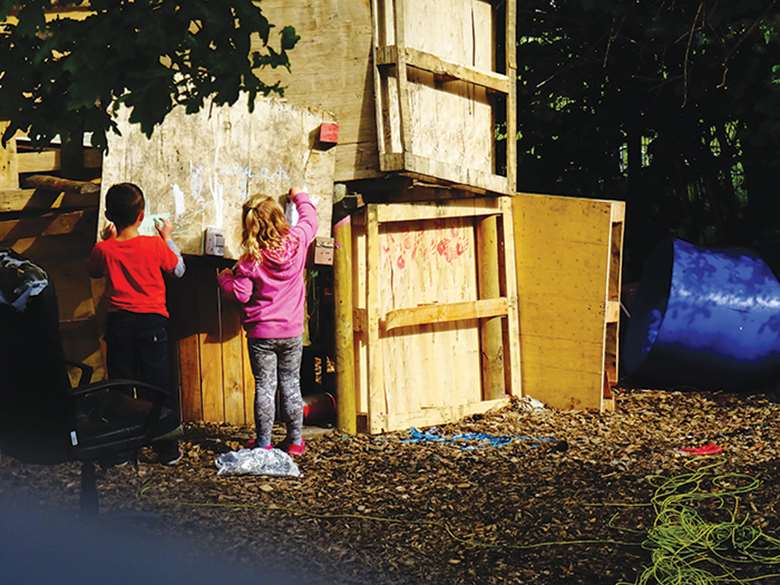The Land
Emily Rogers
Wednesday, May 31, 2017
Wasteland-based "junk playground" on Wrexham's Plas Madoc estate has made headlines for the freedom it gives children to engage in challenging play.

- Playworkers empower children to create an ever-changing space, building their confidence to manage risk for themselves
- Analysis estimates The Land and Wrexham's two other adventure playgrounds generate a social return of £4.60 for every £1 spent
ACTION
The Land is part of a portfolio of play opportunities on Wrexham's Plas Madoc estate, run by the Association of Voluntary Organisations in Wrexham (AVOW). Playworkers started visiting the estate during school holidays 13 years ago with a trailer of loose parts for creative play, then introduced street play. AVOW play department manager Claire Griffiths says this helped create "a playful culture" on the estate, making people "more open and accepting of the idea of a junk playground".
The Land was a piece of wasteland by the estate where Griffiths says children had already explored and played, building "attachment and feelings of ownership to the environment". Realising children needed their own space, playworkers applied for support from environmental funding body WREN. The only alteration needed was a fence, recalls Griffiths, "to protect children's creations, dens, temporary homes and secret spaces". AVOW leased the land from Wrexham Council, opening it as a staffed playground in February 2012 with donated materials, including pieces of wood and plastic tunnels. None of the play materials have monetary value, except the crash mats. "Children want to change and adapt the environment; they can't do this if something has to be protected, due to cost," explains Griffiths. "They never asked for fixed structures or expensive equipment; they wanted fires, to paddle in the water, dig, create and destroy."
Mike Barclay, Wrexham Council's play development co-ordinator, says The Land remains true to adventure playgrounds' origins to enable children "to build, destroy and reconstruct".
"I personally think ‘junk playgrounds' is a better name; the term ‘adventure playgrounds' has become so commercialised. Left to their own devices, most children don't end up creating a neat and tidy space."
At least three playworkers from AVOW's six-strong team attend The Land's two-hour weekday sessions, attracting around 60 children with an average age of nine. They build relationships with the children, intervening where needed, to encourage and extend play. Much of the media coverage of The Land has focussed on children's use of potentially dangerous tools such as saws and hammers, and on their playful contact with the fire usually burning there. Griffiths says playworkers' understanding of the children is "so important" in deciding how much access they have to tools and fire; newcomers' safety is ensured through "graduated access" to them.
The Land's playworkers are supported to use "dynamic risk assessments", which Barclay says means assessing risks as they encounter them "on a moment-by-moment basis" as "children will do things you can't predict". Key to this is ensuring children recognise risks and are able to manage them. A 2015 film about The Land by US filmmaker Erin Davis shows a boy climbing high in a tree. The playworker doesn't instruct him to climb down, but instead remarks that a branch thicker than the one the boy is standing on broke underneath him recently; guiding him towards assessing the risk for himself. "The alternative is that you ban tree climbing," says Barclay. "All that does is focus on what was going wrong, failing to recognise the things that were going right. We've got to go: yes, that kid has gone further than we're comfortable with, but we've got to allow them to benefit from all the things that happen when they go to the edge of their control."
Griffiths says The Land enables children to "create their own narratives, their own worlds for their own reasons". She adds: "It's lovely to watch children overcome their fears, make new friends, and grow in confidence and resilience. Play is a process of trial and error."
AVOW's playwork team received £165,000 last year from the Welsh Government's Families First and Communities First programmes to fund The Land, plus outreach projects across eight communities. AVOW's ability to secure the funding has been bolstered by Wales's "play sufficiency duty"; requiring councils to assess and secure sufficient play opportunities. This contrasts with England's play policy vacuum since 2010, when the coalition government shredded Labour's £235m Play Strategy.
"What we've seen across the UK is these playgrounds trying to survive without local authority support," says Barclay. "If local authorities don't have anybody with a playwork background employed to support children's play, it inevitably drops off the list of priorities."
While funding from government is reducing this year, The Land looks set to benefit from a "significant chunk" of £1m of Invest Local Big Lottery funding, says Barclay.
IMPACT
An analysis of the economic impact of playwork in Wrexham, a May 2016 report commissioned by Wales Council for Voluntary Action, on behalf of Communities First in Wrexham, estimates that for every £1 spent, The Land, The Venture and Gwenfro Valley playgrounds generate a social return of £4.60.
Researchers calculated a monetary benefit from evidence gathered from more than 300 children and adults of these playgrounds increasing physical activity, improving educational attainment, reducing crime and benefits dependency and improving mental health. Parents observed children's improved ability to make friends, calculate and take risks and know their limits. Former users said the playgrounds had helped them sustain relationships and improved their resilience, ability to work as a team, follow instructions and respond positively to change.
North Wales Police said the playgrounds contributed to reduced levels of criminal damage and antisocial behaviour. Schools reported improved attitudes in those referred there and related improvements in literacy, numeracy and language development.




